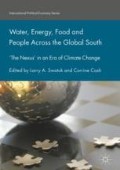Abstract
This collection is centered on the so-called nexus. According to the Merriam-Webster online dictionary, a ‘nexus’ may be defined as: (a) connection, link, and also a causal link; (b) a connected group or series and (c) center, focus (see www.merriam-webster.com/dictionary/nexus). There is a well-known trend in policymaking circles toward integrating water, energy and food policy—the WEF nexus—within an overarching climate change and security ‘nexus’ (see Water Alternatives special issue guest edited by Allouche et al. 2015 and International Journal of Water Resources Development special issue guest edited by Allan et al. 2015). This is reflected in the policy frameworks of the Department for International Development (DfID) and the German Development Agency (GIZ) where the ‘nexus’ is the new operating framework. In addition, significant forums such as the Stockholm World Water Week, hosted by the Stockholm International Water Institute (SIWI), and the World Economic Forum have drawn concentrated attention to the linked security issues surrounding water, energy and food, largely from a management perspective (WEF 2009; 2011; b; 2015). The basic argument is that treating water resource management discreetly—even if within an Integrated Water Resources Management (IWRM) framework—is incomplete, because all water decisions impact possibilities for ‘energy security’ and ‘food security’, particularly within an era of globalization under the overarching context of climate change. According to Stern and Öjendal (quoted in Leese and Meisch 2015: 695–696), a nexus ‘can be understood as a network of connections between disparate ideas, processes or objects; alluding to a nexus implies an infinite number of possible linkages and relations’. However, water, in the words of the WEF (2011, b), is the ‘gossamer’ strands that hold the web of resource use together. In other words, water is at the heart of the nexus. So, water resource use decisions—even if biased toward blue water (defined as flowing surface water and accessible groundwater)—should at minimum take into consideration the role and place of water across key sectors, especially energy and food (and vice versa). There is also a sense of urgency about the nexus: the FAO (2014) highlights that agriculture accounts for 70 percent of global water withdrawals and that food production accounts for 30 percent of global energy use, so linkages are already significant. Moreover, it is anticipated that the rising global population will require 60 percent more food by 2050, that energy demands will increase by 50 percent by 2035 and that irrigation itself will use 10 percent more water than it does now. Thus, it is imperative that management practices ‘get it right’ sooner rather than later (see, also, Leese and Meisch 2015: 698). A nexus approach, it is argued, will enable the crafting of better policy and practice. For Al-Saidi and Elagib (2017: 1137), the WEF nexus is a ‘new kind of environmental policy paradigm’, and the nexus focus has, in their estimation, been quite successful in changing policy debates.
References
Allan, T. 2011. Virtual Water. London: I.B. Tauris & Co.
Allan, T., M. Keulertz, and E. Woertz. 2015. The Water-Food-Energy Nexus: An Introduction to Nexus Concepts and Some Conceptual and Operational Problems. International Journal of Water Resources Development 31 (3): 301–311.
Allouche, J., D. Middleton, and D. Gyawali. 2015. Technical Veil, Hidden Politics: Interrogating the Power Linkages behind the Nexus. Water Alternatives 8 (1): 610–626.
Al-Saidi, M., and N.A. Elagib. 2017. Towards Understanding the Integrative Approach of the Water, Energy and Food Nexus. Science of the Total Environment 574: 1131–1139.
Benson, D., A.K. Gain, and J.J. Rouillard. 2015. Water Governance in Comparative Perspective: From IWRM to a ‘Nexus’ Approach? Water Alternatives 8 (1): 756–773.
Conca, K. 2006. Governing Water. Cambridge: MIT Press.
FAO. 2014. The Water-Energy-Food Nexus. Rome: FAO.
Homer-Dixon, T. 1999. The Environment, Scarcity and Violence. Princeton: Princeton University Press.
Kaplan, R. 1994. The Coming Anarchy. The Atlantic Monthly, February, 44–77.
Leese, M., and S. Meisch. 2015. Securitising Sustainability? Questioning the ‘Water, Energy And Food-Security Nexus’. Water Alternatives 8 (1): 695–709.
Mehta, L. 2001. The Manufacture of Popular Perceptions of Scarcity: Dams and Water-Related Narratives in Gujarat, India. World Development 29 (12): 2025–2041.
Middleton, J., D. Allouche, and S. Allen Gyawali. 2015. The Rise and Implications of the Water-Energy-Food Nexus in Southeast Asia Through an Environmental Justice Lens. Water Alternatives 8 (1): 627–654.
Molle, F. 2008. Nirvana Concepts, Narratives and Policy Models: Insight from the Water Sector. Water Alternatives 1 (1): 131–156.
Savenije, H.H.G. 2002. Why Water Is Not an Ordinary Economic Good, or Why the Girl Is Special. Physics and Chemistry of the Earth 27: 741–744.
Swyngedouw, E. 2007. Technonatural Revolutions: The Scalar Politics of Franco’s Hydro-Social Dream for Spain, 1939–1975. Transactions of the Institute of British Geographers 32: 9–28.
World Economic Forum (WEF). 2009. The Bubble Is Close to Bursting: A Forecast of the Main Economic and Geopolitical Water Issues Likely to Arise in the World During the Next Two Decades, Draft paper for discussion at the World Economic Forum Meeting 2009. Geneva: World Economic Forum.
World Economic Forum (Waughray, D. Ed). 2011a. Water Security: The Water-Food-Energy-Climate Nexus. Washington: Island Press.
World Economic Forum. 2011b. Global Risks 2011, Sixth Edition. World Economic Forum.
———. 2015. Global Risks 2015, Tenth Edition. World Economic Forum.
Author information
Authors and Affiliations
Editor information
Editors and Affiliations
Rights and permissions
Copyright information
© 2018 The Author(s)
About this chapter
Cite this chapter
Swatuk, L.A., Cash, C. (2018). Perspectives on the Nexus: Water, Energy and Food Security in an Era of Climate Change. In: Swatuk, L., Cash, C. (eds) Water, Energy, Food and People Across the Global South. International Political Economy Series. Palgrave Macmillan, Cham. https://doi.org/10.1007/978-3-319-64024-2_1
Download citation
DOI: https://doi.org/10.1007/978-3-319-64024-2_1
Published:
Publisher Name: Palgrave Macmillan, Cham
Print ISBN: 978-3-319-64023-5
Online ISBN: 978-3-319-64024-2
eBook Packages: Political Science and International StudiesPolitical Science and International Studies (R0)

